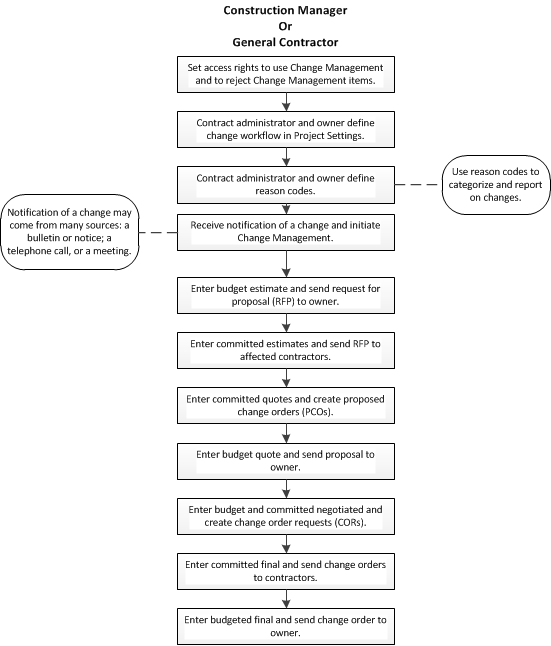Use Change Management to cost all generated documents, post generated documents to any portion of the cost worksheet, and create committed contracts and purchase orders. Change Management provides a central location where you enter all necessary contract, contractor, and costing information about a change. At any stage of the process, you can see the current status of the change, including estimates, costs, documents, and responsibilities of all parties.
Controlling changes involves notifying and coordinating affected project participants as well as containing costs and the schedule for the project. The Change Management Document Window provides an overview of each change from the estimate phase to final approval for both budgeted and committed costs. Since the change process in a project differs according to the nature of each change and the methods a company employs for recording and tracking changes, the Change Management module of Contract Management enables you to create a customized workflow to meet your company’s needs for tracking and resolving changes.
Construction managers (CMs) or general contractors (GCs) can use Change Management to coordinate work and disseminate change information to all affected parties. For example, they must notify the owner of any changes that might affect the schedule or value of the budget contract, control quotes from contractors or subcontractors, negotiate with both the owner and contractors or subcontractors to properly compensate the affected parties, and circulate approval notices to all affected parties once the change is approved.
The following diagram illustrates the typical Change Management process for Construction Managers or General Contractors.

Setting Change Management phases and options
Change Management phases and options are set on the Project Settings Dialog Box. You can determine which budgeted and committed documents are created for the Budget, Quoted, Negotiated, and Final phases, and which cost types to associate with each. It is not necessary to use all the phases if they are not required for your processes. For more information, see Specify Project Settings.
Legal Notices
Copyright © 2015,
Oracle and/or its affiliates. All rights reserved.
Last Published Wednesday, June 17, 2015